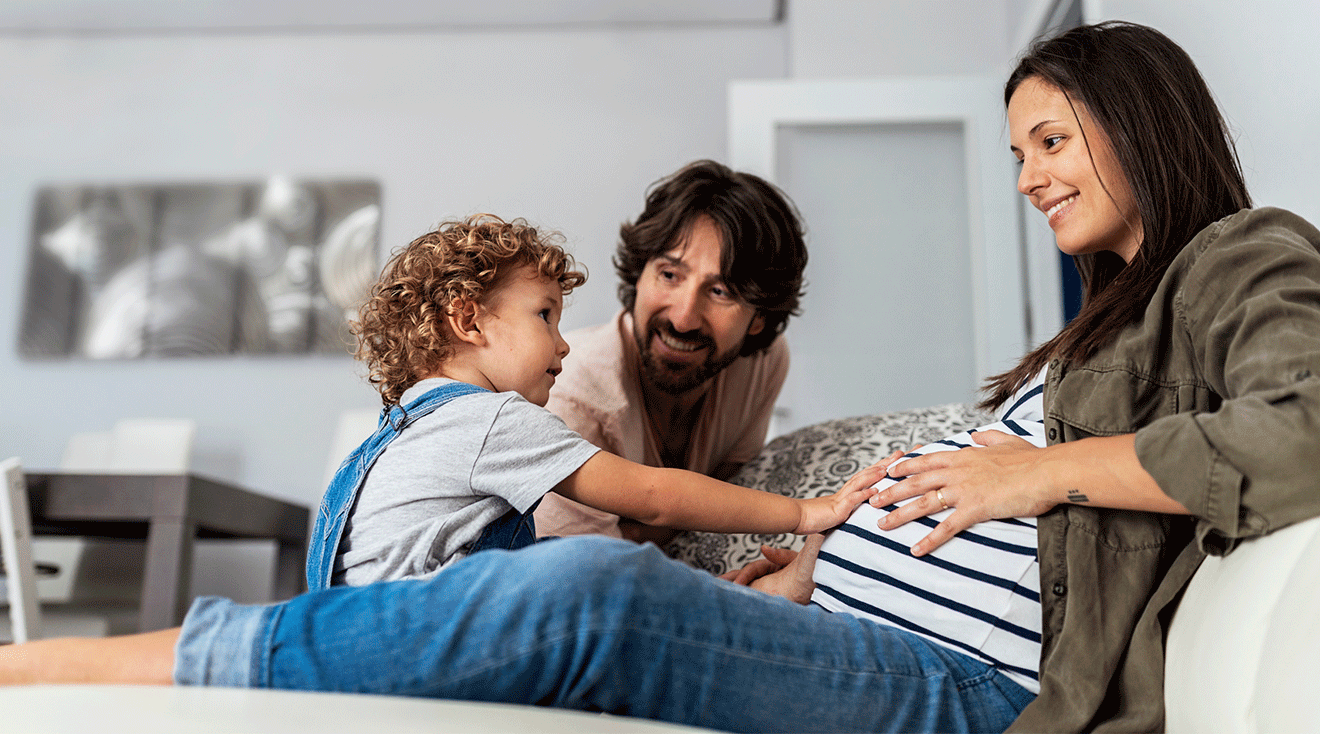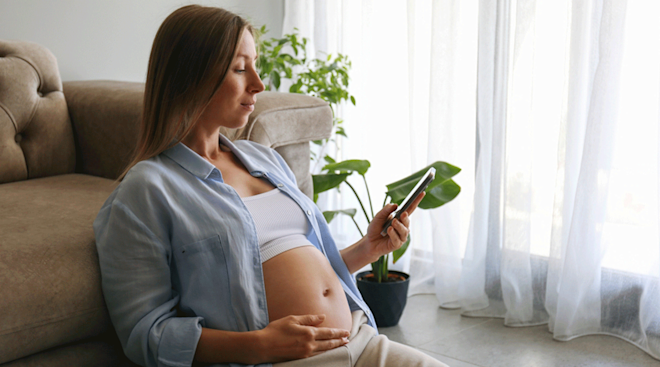10 Things to Know About Your Second Pregnancy
Most women who’ve had multiple children will agree that your second pregnancy is almost always different than your first—both physically and emotionally. The truth is that in a subsequent pregnancy, your body has been through this whole childbearing thing before; it knows what to do, and things you didn’t notice until six months in the first time around may become apparent a whole lot sooner. On top of that, you may feel less surprised and overwhelmed by some of the symptoms you’ve already felt before.
That said, those differences can also make it hard to know what to expect. Read on to find out what you need to know about your second pregnancy so you can feel a little more prepared.
First-time moms may not start showing off an obvious baby bump until their second trimester begins, while second time moms will likely have a hard time hiding their belly earlier on.
When I was pregnant with my first daughter, I didn’t feel like I actually had a bump until I was almost 20 weeks along. With my second, I barely got past week 12 before it became very clear that I was pregnant.
This isn’t just your imagination, BTW. “This happens as a result of the changes in muscles and ligaments that occur with first pregnancy,” explains Sara Holt, CNM, MS, CAS, PMH-C, midwife and owner of Byenvini Baby. “The rectus abdominis muscles, which expanded before, tend to yield sooner. This results in the uterus coming forward and ‘showing’ earlier the second (or third, or fourth) time around. Moreover, abdominal skin is not as taut, which facilitates a baby bump appearing sooner.”
Pregnancy changes your body in so many ways. The second time around, you may find yourself feeling a lot more aches, pains and pressure, especially in the pelvic area. “The abdominal muscles and uterine ligaments have become more lax and don’t support the growing uterus as they did with the first pregnancy,” explains Julie Charlton, CNM, a certified nurse-midwife at Pediatrix Medical Group in Atlanta, Georgia. “The ligaments that attach to the uterus—notably the round ligaments located on either side of the lower abdomen and the broad ligament that attaches to the sacrum bone—tend to become more bothersome for second-time moms.”
Even moms who may have had a relatively pain-free first experience can have achiness in their second pregnancy. “Like many first-time parents, I cruised through my first pregnancy with little fuss,” Holt says. “Aside from a bit of manageable nausea in the first trimester, it seemed easy. I found myself thinking things like, ‘Wow, I don’t know what the big deal is with this pregnancy stuff!’ My second pregnancy quickly cured me of those thoughts.” She explains that during her second pregnancy, she finally understood the complaints she had heard from so many other pregnant women before.
There’s nothing like pregnancy exhaustion—especially second-pregnancy exhaustion. Not only are you dealing with a ton of changes happening within your body while literally growing a human being, but you’re also likely taking care of another child who is just as demanding of your time and energy. “With a first pregnancy, there’s much more freedom to nap, rest or go to bed directly after dinner,” Holt says. “In a second pregnancy, whether your first child is a busy toddler or a school-aged child, much of your time is no longer yours.”
Aside from struggling to find time to relax, your body may also still be recovering from your first pregnancy, especially if your pregnancies weren’t far apart. Holt explains that nutritional stores, like iron, can be compromised, which may account for anemia that could contribute to extra fatigue. She also notes that weakened pelvic and abdominal muscles can cause back or pubic pain that can be worse at night, making it hard to fall and stay asleep.
The changes that come with a second pregnancy aren’t all bad! For one thing, you may get to feel those sweet first flutters and kicks sooner than you did with your first. Those weakened muscles are, once again, the cause of that, Charlton says, “The movements can seem more vigorous and at times painful since the abdominal wall and muscles are more relaxed, allowing baby more freedom of movement,” she adds.
But movement is also identified earlier since you’ve already experienced it in the past—basically, you’re more aware of how it feels. This is something Amani Aliyya, influencer, wife and mom of two kids from New Orleans, noticed during her second pregnancy. “I think because I remembered what they felt like, I knew sooner when baby was kicking,” she says. “My first pregnancy I wasn’t really sure if it was a flutter or indigestion. It’s such a good feeling to know your baby is inside your belly growing and thriving. To me, being able to feel the baby move sooner was exciting.”
Your first pregnancy can be terrifying and anxiety-inducing. And while your second pregnancy may not be a walk in the park, you’ve been through it (or most of it) before, meaning you’ll probably feel more comfortable with what’s going on. Kamini, mom of five from North Carolina, says this is one of the biggest things she noticed about her second pregnancy: “I trusted my body more and understood what to expect. That sense of familiarity made me feel more confident.” Holt agrees, saying, “I often wish I could give first-time mothers the confidence and ease of a second time mom.”
After going through pregnancy once, some moms may think they know exactly what to expect the next go around, but second-pregnancy symptoms can be completely different. For example, I had a terrible case of pregnancy sinusitis during my entire first pregnancy, but didn’t feel that at all during my second. Amani notes that, during her first pregnancy, she was able to find some nausea relief, but during her second, that nausea stuck around the entire nine months.
You may also experience new conditions or complications in a second pregnancy. This can be especially jarring if your first pregnancy was smooth sailing. “With my second pregnancy, I experienced placenta previa, which completely threw me for a loop,” Kamini says. And some conditions that you had during your first pregnancy and expect to experience again, like gestational diabetes or preeclampsia, may be completely absent, despite an increased risk.
Even though a second pregnancy can bring a new sense of confidence, most moms will still experience some degree of anxiety or fear about adding a new baby into the mix.
I remember hugging my oldest daughter and wondering how I could possibly love our new baby as much as I loved her (it’s something you just don’t understand until you have more than one kid). Kamini can relate, saying, “There were moments when I felt overwhelmed, thinking about how I’d manage my attention between two children.”
This is completely normal, reassures Holt, who adds that many moms also feel worried about how their relationship with their older child is going to be affected by welcoming a new baby. She recalls, “I remember deciding I had made a huge mistake about a week before I gave birth to my second son. Then, watching them together made my heart swell with love and pride”
You know all of those Braxton Hicks contractions you felt toward the end of your first pregnancy? You may be surprised to find that you experience those a lot earlier during your second pregnancy. According to Holt, this is due to “increased sensation and body awareness.” You also might find that these false contractions feel more intense than they did the first time around. “This can be unsettling to expecting mothers,” Holt says. “It’s important to remember that these contractions aren’t painful. Rather, practice contractions present as pressure or tightening sensations.” She says that if you feel painful contractions before 36 weeks of pregnancy, you should contact your midwife or physician right away. However, if it’s more uncomfortable tightening and pressure, this is probably par for the course.
Good news: Things in the delivery room may be sped up a bit during a subsequent birth experience. “The average time spent in active labor (from 6 centimeters to 10 centimeters dilation) is usually about half as long with a second or subsequent labor,” Holt says. “Many times pregnant people who experienced long labors with their first baby are quite surprised by the shorter duration of labor.” She also notes that labor symptoms tend to escalate more quickly with a second baby. Charlton also points out that the second stage of labor (pushing) is also generally shorter.
In general, labor may be a little easier, too. With my first daughter, I was induced and in labor for more than 36 hours; I pushed for almost two hours, and a vacuum had to be involved in order for her to come out. With my second daughter, I was in the hospital for only about four hours before I started pushing—and I only pushed for about 25 minutes before she arrived. Holt says you’re less likely to need intervention with a vacuum or forceps in a second birth—and c-sections are less common for moms who’ve previously experienced a vaginal birth.
For a few days after giving birth, many moms will feel afterpains or cramping; this happens as the uterus returns to its original size. Sorry to say that this can be more intense for second-time moms. There’s good news, too, though: “Recovery for both cesarean section and vaginal deliveries tend to be easier,” Charlton says. Moreover, families are more comfortable with newborn care and have a better idea of what to expect during the first few weeks after delivery, she adds. Personally, I found that I felt much better after my second pregnancy than my first. I wasn’t in pain for as long, and I was up and about much faster.
Please note: The Bump and the materials and information it contains are not intended to, and do not constitute, medical or other health advice or diagnosis and should not be used as such. You should always consult with a qualified physician or health professional about your specific circumstances.
Plus, more from The Bump:
Julie Charlton, CNM, is a certified nurse-midwife at Pediatrix Medical Group in Atlanta, Georgia. She completed her master of nursing in midwifery at Emory University.
Sara Holt, CNM, MS, CAS, PMH-C, is a midwife and owner of Byenvini Baby.
Cochrane Library, Relief of pain due to uterine cramping/involution after birth, October 2020
Learn how we ensure the accuracy of our content through our editorial and medical review process.
Navigate forward to interact with the calendar and select a date. Press the question mark key to get the keyboard shortcuts for changing dates.




















































